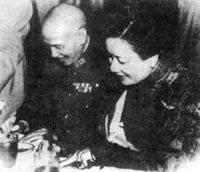Difference between revisions of "Supreme commander"
From Wiki China org cn
imported>Ciic (Created page with '[[File:supremecommander.jpg|thumb|200px|right|Chiang Kai-shek, accompanied by his wife, signs the letter of appointment to assume office as supreme commander of the China War Zon...') |
imported>Ciic |
||
| Line 1: | Line 1: | ||
[[File:supremecommander.jpg|thumb|200px|right|Chiang Kai-shek, accompanied by his wife, signs the letter of appointment to assume office as supreme commander of the China War Zone in 1942.]] | [[File:supremecommander.jpg|thumb|200px|right|Chiang Kai-shek, accompanied by his wife, signs the letter of appointment to assume office as supreme commander of the China War Zone in 1942.]] | ||
| − | On [[CIIC:Selected anniversaries/January 5, 2009|January 5]], 1942, [[Chiang Kai-shek]] announced in [[Chongqing]] that he would take up the post of '''supreme commander''' of the China War Zone. The position had been proposed by countries that had signed up to the Declaration by the United Nations to direct the troops fighting in China, Thailand, Vietnam and Burma (now called Myanmar) and coordinate the three headquarters of chiefs of staff of the China War Zone, Indian Army and South Pacific War Zone. | + | On [[CIIC:Selected anniversaries/January 5, 2009|January 5]], 1942, [[Chiang Kai-shek]] announced in [[Chongqing]] that he would take up the post of '''supreme commander''' (最高指挥官) of the China War Zone. The position had been proposed by countries that had signed up to the Declaration by the United Nations to direct the troops fighting in China, Thailand, Vietnam and Burma (now called Myanmar) and coordinate the three headquarters of chiefs of staff of the China War Zone, Indian Army and South Pacific War Zone. |
[[Category: history]] | [[Category: history]] | ||
Latest revision as of 03:07, 3 June 2013
On January 5, 1942, Chiang Kai-shek announced in Chongqing that he would take up the post of supreme commander (最高指挥官) of the China War Zone. The position had been proposed by countries that had signed up to the Declaration by the United Nations to direct the troops fighting in China, Thailand, Vietnam and Burma (now called Myanmar) and coordinate the three headquarters of chiefs of staff of the China War Zone, Indian Army and South Pacific War Zone.
